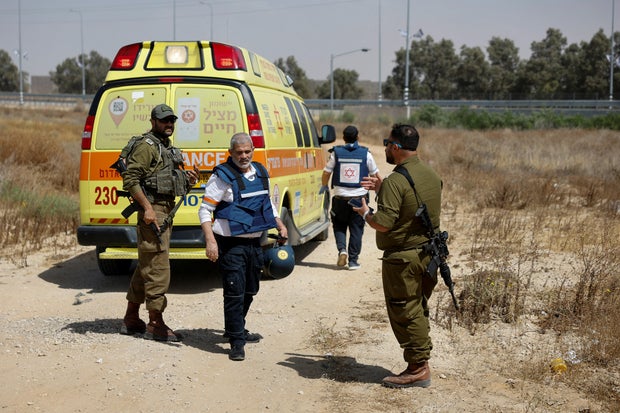Hamas militants on Sunday attacked Israel’s main crossing point for the delivery of humanitarian aid to the Gaza Strip, dealing a blow to the ongoing fire-surge efforts that appear in a stalemate with both sides blaming each other.
The attack on Israel’s Kerem Shalom crossing injured several Israelis, Israel’s Channel 12 News reported, prompting authorities to close the terminal, halting critical shipments of food and other humanitarian aid to Gaza.
The Israeli military reported 10 launches at the Kerem Shalom crossing. Hamas said it was targeting Israeli soldiers in the area. Israel’s Channel 12 TV channel said 10 people were injured, three of them seriously.
Amir Cohen/REUTERS
The military said the crossing was immediately closed, halting aid deliveries from there to hard-hit Gaza. It was unclear how long the closure would remain in effect.
The incident occurred at a time when Gaza is facing a humanitarian crisis with shortages of food, medicine and other humanitarian items.
The attack threatened to complicate ongoing ceasefire negotiations in Egypt. Egyptian and Hamas officials said the deal under discussion calls for an extended pause in fighting in exchange for the release of Israeli hostages held by Hamas. But the parties remain at odds over whether the agreement would include an end to the war and the complete withdrawal of Israeli troops from Gaza.
Saturday’s ceasefire talks ended without developments, a senior Hamas source close to the Cairo talks told CBS News. The source added that “tomorrow a new round will begin”.
Israel did not send a delegation to the talks, saying it would only do so when Hamas responded to Israel’s latest proposal. An adviser to Israeli Prime Minister Benjamin Netanyahu told CBS News on Saturday that “the end of the war will come with the end of Hamas in Gaza.”
That sentiment continued on Sunday, when Netanyahu accused Hamas of making unacceptable demands.
While asserting that Israel demonstrated a willingness to make concessions, he said: “Hamas still maintained its extreme positions, first and foremost the withdrawal of our forces from the strip, concluding the war and leaving Hamas intact.”
“Israel will not agree to Hamas’ demands, which would mean surrender; it will continue to fight until all its goals are achieved,” he said.
Amir Cohen/REUTERS
In a statement released shortly after Netanyahu, Hamas chief Ismail Haniyeh said the group was still interested in reaching a comprehensive ceasefire that would end Israeli “aggression.” Reuters reported. Haniyeh also said the deal must guarantee Israel’s withdrawal from Gaza and reach a “serious” deal to release Israelis held hostage in exchange for the release of Palestinian prisoners.
At the same time, Israel’s defense minister warned of “a powerful operation in the very near future in Rafah and other locations throughout Gaza.”
Defense Minister Yoav Gallant said: “We see signs that Hamas does not intend to reach any agreement.”
Rafah is Gaza’s southernmost city, on the border with Egypt, where more than half of Gaza’s 2.3 million residents now seek shelter from Israeli attacks. Rafah is a key entry point for aid.
Israel launched its war in response to Hamas’ cross-border attack on October 7, which killed around 1,200 people and took another 250 hostage. An Israeli air and ground offensive killed more than 34,500 people, according to Palestinian health officials, displaced about 80% of Gaza’s population and led to a humanitarian disaster.
Egypt and Qatar have been working with the United States to broker a ceasefire.
CIA Director William Burns traveled to Cairo, Egypt, on Friday for negotiations. The visit follows a series of technical talks and a new proposal from Israel that US officials described as “generous”.
The latest ceasefire agreement, expected to last several weeks, proposed by mediators, depends on the exchange of hostages. In the proposed agreement, for each hostage released by Hamas, Israel would have to release a greater number of Palestinians held in Israeli prisons.
On Sunday, Netanyahu’s Cabinet approved a measure to close Qatar Al Jazeera news channel, accusing him of broadcasting anti-Israel incitement. The decision threatened to further disrupt ceasefire negotiations. There was no immediate comment from Qatar.

























